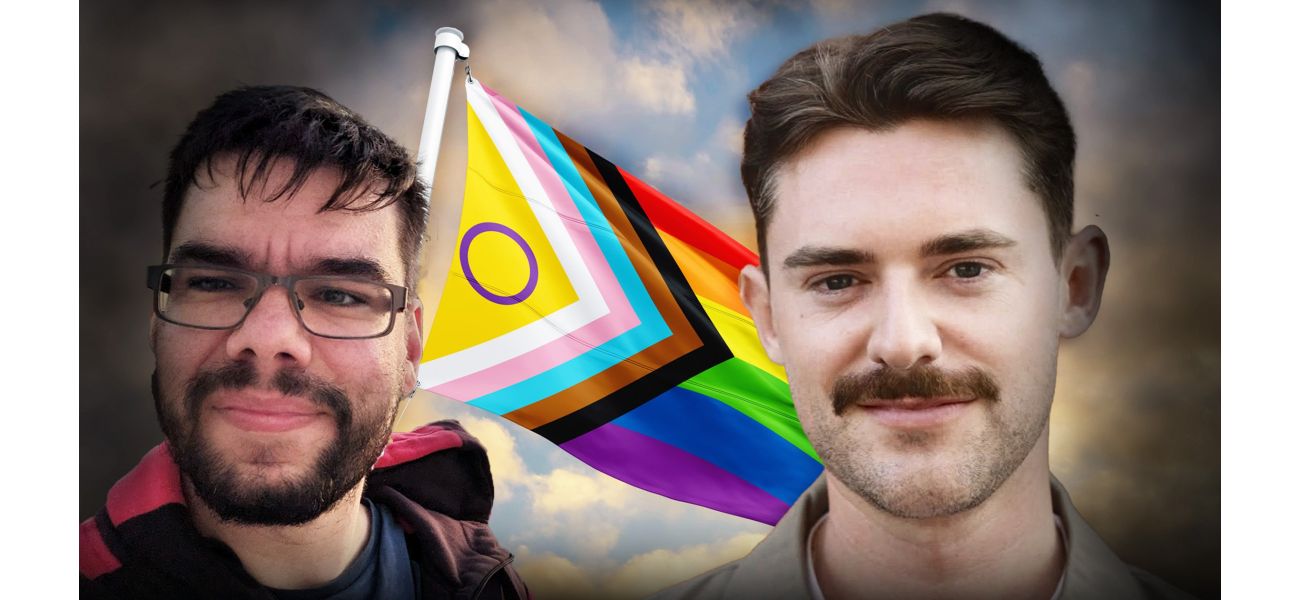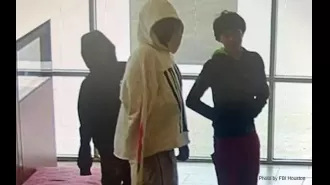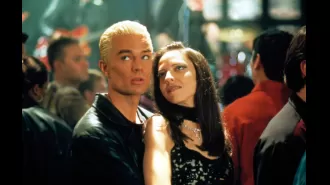Hate crimes against LGBTQ+ people decrease, but violence remains a regular occurrence.
One victim of a homophobic hate crime stated that they were more concerned about when the crime would happen, rather than if it would happen.
October 22nd 2024.

Mario Toubes-Rodrigo and Dan Harry have both experienced the devastating effects of homophobic hate crimes. As a gay man himself, Mario has witnessed his friends being attacked on the night before Pride as they were leaving an LGBTQ+ nightclub. This has caused him to worry constantly in recent times. As an applications leader in London, he has seen a concerning trend - hate crimes targeting individuals based on their sexual orientation have risen by a staggering 112% in the last five years.
Mario, who resides in Golders Green, a neighborhood in north west London, shares that he has personally seen more attacks within his group of friends in the past four to five years than he has in his entire life. Unfortunately, Mario himself has also been a victim of a hate crime. During the COVID-19 pandemic, his neighbor would shout homophobic insults at him through the walls and across the street on a daily basis. This torment eventually led to the perpetrator being imprisoned two years ago. Mario shares that for him, it was not a matter of if he would experience a hate crime, but rather when it would happen.
However, there is some hope in the statistics. According to the Home Office, homophobic hate crimes have decreased by 8% between March 2023 and March of this year, while transphobic violence has decreased by 2%. Overall, hate crimes targeting any marginalized group have decreased by 5%, with a total of 140,561 reported incidents. While this may seem like a positive trend, LGBTQ+ advocates and victims of hate crimes point out that the slight decrease is not necessarily good news. The number of anti-LGBTQ+ hate crimes in England and Wales is still higher than it was five years ago. In fact, there were 18,596 reported offenses based on sexual orientation between 2020 and 2021, and this number has risen to 22,839 in the latest data. Despite a 12% decrease from the previous year, when 26,152 hate crimes occurred, there is still cause for concern.
Dan Harry, a 28-year-old presenter who was a victim of a homophobic hate crime in 2022, shares that for many LGBTQ+ individuals, encountering hate crimes has unfortunately become a part of their daily lives. Dan, who was a contestant on the UK's first gay dating show, I Kissed A Boy, recalls an incident where he was heading home from a date near London's King's Cross St Pancras station and noticed three men following him on the escalators. They continued to follow him onto the platform, making threatening homophobic remarks and laughing among themselves. Dan tried to ignore them, but he could feel them getting closer and closer, almost as if they were trying to push him onto the train tracks. He managed to get on a different carriage, but the men continued to change carriages at each stop, until they eventually found Dan and continued their harassment before departing. The experience left Dan feeling terrified and when he finally arrived home, he called his mother, who was understandably upset by the incident. Dan tried to reassure her that he was okay, but he also had to explain that unfortunately, this is something that can happen to members of the LGBTQ+ community.
Mario shares the same sentiments as Dan. He believes that the political climate and the headlines of the past decade have only worsened homophobia and transphobia in the UK. He also points out that the increasing hostility towards transgender individuals has contributed to the rise in hate crimes. The UK used to be known as the most LGBTQ+ friendly place in Europe, but since 2015, it has dropped to 16th place, which activists attribute to anti-trans policies such as the ban on puberty blockers for trans youth and the lack of a conversion therapy ban.
If someone has experienced anti-LGBTQ+ violence or abuse, it is important to report the incident to the local police force. Reports can also be made online through a specific service for hate crimes called True Vision, and there is also the option to have someone else report it on the victim's behalf. For those who need a safe space to talk, Galop's National LGBT+ Hate Crime Helpline is available. Galop is an organization that works with LGBTQ+ victims and survivors of violence, and the hotline is run by LGBTQ+ individuals. They can be reached by calling 0800 999 5428, emailing [email protected], or through webchat on their website.
Dan adds that he believes the political climate and the headlines of the past decade have only exacerbated homophobia and transphobia in the UK. He believes that this environment empowers individuals with prejudiced views to act on their beliefs and bring their hatred into public spaces. Ben Kernighan, the interim CEO of Galop, points out that the Home Office figures only cover hate crimes that have been reported to the police, and that many incidents go unreported. He shares that government research has shown that over 90% of anti-LGBT+ hate crimes go unreported, and this could be due to past negative experiences with reporting and low prosecution rates. Additionally, there is also the issue of hate crimes being misclassified as anti-social behavior.
Simon Blake OBE, CEO of the queer charity Stonewall, also expresses concern about the marginal decrease in anti-LGBTQ+ offenses, especially in light of the increase in religious hate crimes. He emphasizes the importance of working together to create a society where everyone is safe and respected, and where hate crimes are not tolerated.
Within these statistics are regular individuals who are now left to live their lives. For Dan, something as simple as boarding a train has become a daunting task. The actions of those men who harassed him have made it that much harder for him to live as an openly gay man. He recalls that he had his earphones in, minding his own business, just trying to get home, when he was targeted. It is a reminder that hate crimes can happen to anyone, at any time, and it is something that the LGBTQ+ community continues to fight against.
Mario, who resides in Golders Green, a neighborhood in north west London, shares that he has personally seen more attacks within his group of friends in the past four to five years than he has in his entire life. Unfortunately, Mario himself has also been a victim of a hate crime. During the COVID-19 pandemic, his neighbor would shout homophobic insults at him through the walls and across the street on a daily basis. This torment eventually led to the perpetrator being imprisoned two years ago. Mario shares that for him, it was not a matter of if he would experience a hate crime, but rather when it would happen.
However, there is some hope in the statistics. According to the Home Office, homophobic hate crimes have decreased by 8% between March 2023 and March of this year, while transphobic violence has decreased by 2%. Overall, hate crimes targeting any marginalized group have decreased by 5%, with a total of 140,561 reported incidents. While this may seem like a positive trend, LGBTQ+ advocates and victims of hate crimes point out that the slight decrease is not necessarily good news. The number of anti-LGBTQ+ hate crimes in England and Wales is still higher than it was five years ago. In fact, there were 18,596 reported offenses based on sexual orientation between 2020 and 2021, and this number has risen to 22,839 in the latest data. Despite a 12% decrease from the previous year, when 26,152 hate crimes occurred, there is still cause for concern.
Dan Harry, a 28-year-old presenter who was a victim of a homophobic hate crime in 2022, shares that for many LGBTQ+ individuals, encountering hate crimes has unfortunately become a part of their daily lives. Dan, who was a contestant on the UK's first gay dating show, I Kissed A Boy, recalls an incident where he was heading home from a date near London's King's Cross St Pancras station and noticed three men following him on the escalators. They continued to follow him onto the platform, making threatening homophobic remarks and laughing among themselves. Dan tried to ignore them, but he could feel them getting closer and closer, almost as if they were trying to push him onto the train tracks. He managed to get on a different carriage, but the men continued to change carriages at each stop, until they eventually found Dan and continued their harassment before departing. The experience left Dan feeling terrified and when he finally arrived home, he called his mother, who was understandably upset by the incident. Dan tried to reassure her that he was okay, but he also had to explain that unfortunately, this is something that can happen to members of the LGBTQ+ community.
Mario shares the same sentiments as Dan. He believes that the political climate and the headlines of the past decade have only worsened homophobia and transphobia in the UK. He also points out that the increasing hostility towards transgender individuals has contributed to the rise in hate crimes. The UK used to be known as the most LGBTQ+ friendly place in Europe, but since 2015, it has dropped to 16th place, which activists attribute to anti-trans policies such as the ban on puberty blockers for trans youth and the lack of a conversion therapy ban.
If someone has experienced anti-LGBTQ+ violence or abuse, it is important to report the incident to the local police force. Reports can also be made online through a specific service for hate crimes called True Vision, and there is also the option to have someone else report it on the victim's behalf. For those who need a safe space to talk, Galop's National LGBT+ Hate Crime Helpline is available. Galop is an organization that works with LGBTQ+ victims and survivors of violence, and the hotline is run by LGBTQ+ individuals. They can be reached by calling 0800 999 5428, emailing [email protected], or through webchat on their website.
Dan adds that he believes the political climate and the headlines of the past decade have only exacerbated homophobia and transphobia in the UK. He believes that this environment empowers individuals with prejudiced views to act on their beliefs and bring their hatred into public spaces. Ben Kernighan, the interim CEO of Galop, points out that the Home Office figures only cover hate crimes that have been reported to the police, and that many incidents go unreported. He shares that government research has shown that over 90% of anti-LGBT+ hate crimes go unreported, and this could be due to past negative experiences with reporting and low prosecution rates. Additionally, there is also the issue of hate crimes being misclassified as anti-social behavior.
Simon Blake OBE, CEO of the queer charity Stonewall, also expresses concern about the marginal decrease in anti-LGBTQ+ offenses, especially in light of the increase in religious hate crimes. He emphasizes the importance of working together to create a society where everyone is safe and respected, and where hate crimes are not tolerated.
Within these statistics are regular individuals who are now left to live their lives. For Dan, something as simple as boarding a train has become a daunting task. The actions of those men who harassed him have made it that much harder for him to live as an openly gay man. He recalls that he had his earphones in, minding his own business, just trying to get home, when he was targeted. It is a reminder that hate crimes can happen to anyone, at any time, and it is something that the LGBTQ+ community continues to fight against.
[This article has been trending online recently and has been generated with AI. Your feed is customized.]
[Generative AI is experimental.]
0
0
Submit Comment





